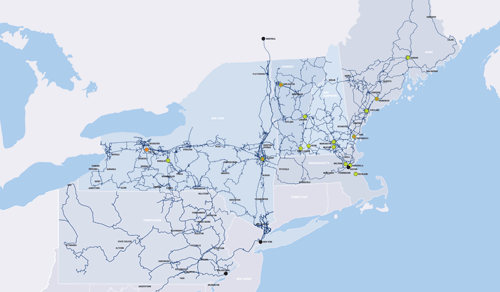Maintaining an on-premises data center can be a burden on companies. Organizations need to budget for the capital expenses of housing and provisioning hardware as well as the ongoing operating costs. The 2016 Data Center Industry Survey found that 50% of IT budgets are shrinking.
When companies operate a data center on-site, it can be difficult to keep up with necessary upgrades and security patches. Maintenance and monitoring tasks keep your IT team from focusing on the core business and innovating to gain a competitive edge.
A popular solution to these problems is to move your data center off-site. In fact, more than 75% of companies have an off-premises data center according to the Uptime Institute.
When companies consider migrating their data center, they need to decide between using the cloud or a colocation. While these alternatives may seem similar, there are key differences that will influence your decision. Cloud and colocation offer businesses different levels of control, management, and flexibility.
Colocation: A Shared Experience
 Colocation provides physical housing for the company’s hardware. Your business supplies all of the servers, networking, and applications, and the colocation provider provides you space, power, cooling and connectivity. You benefit from cost savings by sharing the expense of power, cooling, and real estate with other colocation customers.
Colocation provides physical housing for the company’s hardware. Your business supplies all of the servers, networking, and applications, and the colocation provider provides you space, power, cooling and connectivity. You benefit from cost savings by sharing the expense of power, cooling, and real estate with other colocation customers.
The ideal colocation site will provide state-of-the-art security and 24/7/365 support from their Network Operations Center (NOC) .
Colocation is a great option for companies that are outgrowing their existing data center or need a secondary site for disaster recovery. Other services such as management and maintenance may be available, but your company is often still responsible for monitoring, managing, and maintaining the equipment. The tradeoff is that when you move to a colocation, you don’t sacrifice control of your equipment or data.
Cloud: Up, Up, and Away
With the cloud, the data center is migrated to a virtual infrastructure. Instead of relying on its own equipment, the company gains infrastructure as a service (IaaS) over the Internet. IaaS resources include servers and networking. These resources are available for a monthly fee, and customers only pay for what they need.
The cloud provider is responsible for management and maintenance of the infrastructure. Any upgrades are taken care of by the cloud vendor. If workloads change, your business can easily accommodate them by scaling up or down to meet capacity needs.
Cloud vendors take different approaches to security. Before partnering with a cloud provider, look carefully at the service level agreement to see who is responsible for which aspects of security. Also determine how much control you have over the data you will be storing in the cloud.
Data Protection Options
 Both the cloud and colocation present opportunities for backup and disaster recovery in a geographically diverse environment. However, with cloud, your company doesn’t need to budget for the capital expenses necessary to duplicate your primary data center. The hybrid cloud also makes synchronizing backups easier, guaranteeing rapid recovery time objectives (RTOs) and recovery point objectives (RPOs).
Both the cloud and colocation present opportunities for backup and disaster recovery in a geographically diverse environment. However, with cloud, your company doesn’t need to budget for the capital expenses necessary to duplicate your primary data center. The hybrid cloud also makes synchronizing backups easier, guaranteeing rapid recovery time objectives (RTOs) and recovery point objectives (RPOs).
Because colocation facilities provide services to many clients, they can afford the best in physical security and surveillance. The best colocation sites are heavily fortified with multiple layers of security to prevent unauthorized access. These sites are also designed to be resistant to natural disasters and have redundant power supplies in case of an outage.
Data Center Goals
For companies choosing to move their data centers off-site, either a colocation or the cloud can be the right decision. Ultimately, making the right choice hinges on your business goals and the status of your current data center. Moving to a colocation facility can present an opportunity to upgrade some equipment before migrating. The cloud enables your company to transition away from legacy systems.
When you partner with FirstLight, you can’t lose whether you choose colocaton or the cloud for your data center. Our cloud offerings are connected to an extensive high-speed fiber optic network for optimum availability and performance. With our cloud services you gain scalability while maintaining control over your data.
FirstLight has 12 colocation and data center sites throughout the Northeast. Our colocation sites are designed to provide business continuity and disaster recovery through carrier-grade infrastructure and redundant internet and power supplies. All our sites have 24/7/365 surveillance, and some of our facilities offer military-grade protection.
Still need help deciding between the cloud or a colocation? Reach out to FirstLight for expert guidance.




















